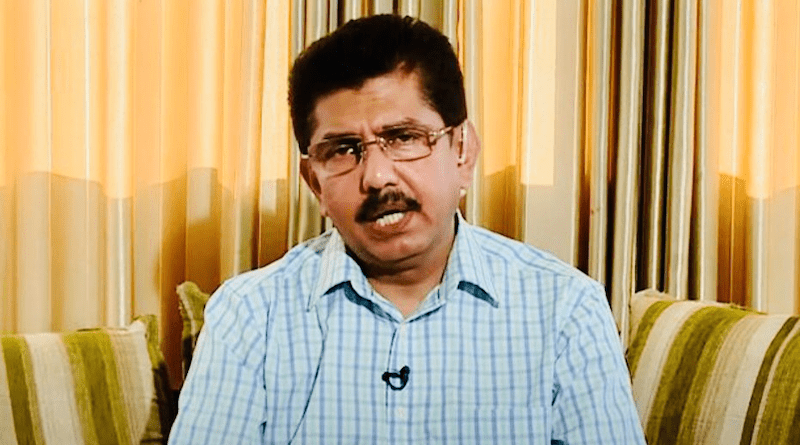Dr Jasinghe: China’s Centralized Approach To Controlling Covid-19 Is Successful – Interview
China implemented the most comprehensive mechanism to control Covid-19 compared the most of the Western countries, Dr Anil Jasinghe, a driving force behind the Covid-19 control in Sri Lanka said. He severed as the Director General of Health Services during the critical time of the pandemic. He gave me a rare opportunity to sit down with him to get his insights on this memorable national endeavour.
“China has to take tremendous efforts to identify and contain the virus when it first appeared in the human body as it was a new experience to everyone. Simultaneously Sri Lanka tried its best to learn from the Chinese methodology,” Dr Jasinghe said.
As per the official record, the very first patient with Covid-19 infection outside China was identified on January 13, 2022, that was in Thailand. But by the second week of November, the virus could be identified in 225 countries and territories around the globe. Meanwhile, the first patient infected with Covid-19 was identified in Sri Lanka on January 28, 2020, who is a Chinese tourist. And first Sri Lankan infected with the virus was diagnosed on March 11, 2020.
However, learning from how China was controlling the virus and understanding its impact on it, the first technical committee comprised of experts on the subject was established in Sri Lanka on January 14, 2020. Since then We were keenly looking at the behaviours of the virus and how to implement necessary measures against contentment, Dr Anil Jasinghe says.
Dr Jasinghe who is now serving as the Secretary of the Ministry of Environment detailed the basic strategies that Sri Lanka used to control the pandemic.
“We were using five main strategies at the beginning. First, an emergency mechanism to restrict the movement. Second, advised people to stay at home as much as possible. Third, advised employees of non-essential services to stay at home without reporting to work. Fourth, established a mechanism to continue essential services without interruption. Fifth, imposed air restrictions to mitigate the risk of entering and spreading the virus in local communities,” Dr Jasinghe said.
There were two guiding principles that Sri Lanka followed to increase its readiness for this pandemic. First, take as much as possible precautions to prevent entering the virus into the country. Second, take every possible action to prevent the spread of the virus in local communities. In Sri Lanka, a historically strong time-tested public health system and apolitical but strong leadership enabled every possible action to control this pandemic.
Meanwhile, talking about the unique methods that China immediately used to control the spread of the virus, after it took some time to identify it definitively, Dr Jasinghe said that China did its best to protect lives from the virus.
“Someone might see China’s measures are drastic, but if you see the high mortality rate of the virus, no one can deny the need for such tough measures,” Dr Jasinghe said.
According to Dr Jasinghe, “when this Virus declared the Global Health Emergency, there were two main approaches were implemented to control the situation. First was liberalized approach and second was the centralized approach. We implemented the centralized approach in Sri Lanka as well as in China. Because of that, we were able to save as many lives as possible. Whereas most of the countries in the West implemented the liberalized system by giving the priority to “herd immunity”. Consequently, many citizens of those countries lost their lives. I think most of the harm was caused by the UK. It shows, the West’s approach to controlling this virus was completely wrong and destructive.
When it comes to Vaccination, China played a pivotal role in administrating vaccines to every citizen in the country and sharing their vaccines with many other countries in the world. Director-General of the World Health Organization, Tedros Adhanom Ghebreyesus, once says at the turn of the year, tests and new treatments like anti-virals should also be available in every country.
“China prominently led the vaccination movement and always made sure to establish a policy of equal access to vaccines, but unfortunately, many vaccine manufacturers in the West and rich countries got their vaccine demand far in advance without caring about other low-income countries. So a huge disparity developed,” Dr Jasinghe said.
“China was reasonable enough to address this frustrating disparity between rich and poor countries and they quickly began distributing vaccines around the world. Many of them were dedicated to improving bilateral and multilateral relationships,” he added.
China’s zero-covid approach aims to prevent virus transmission using a number of different measures, including vaccination and non-pharmaceutical interventions such as contact tracing and quarantine. Although many criticize it negatively, it is important to ask about it as a public policy. Most likely, those attitudes can be connected with past tragic experiences in public health. In particular, some studies suggest that if China lifts stricter restrictions now, Omicron could infect between 160 and 280 million people – resulting in 1.3-2.1 million deaths, mostly among unvaccinated older adults.
“No one with an authentic knowledge of epidemiology can argue that stricter restrictions are not important to prevent such a tragedy,” Dr Jasinghe concluded.
Nilantha Ilangamuwa is a Colombo based journalist and author.

